Cornell Agroforestry Resource Center shows how forest owners can reap cash without harming the environment
By Susan Lang

Got trees? Think that the only way to make some money from them is to cut some down for firewood or lumber? Think again.
Forest farming -- using forested areas in sustainable ways to promote rural economic development -- makes better and more profitable use of wooded land through such options as growing ginseng and gourmet mushrooms, maintaining goats or selling chips and shavings, maple syrup or specialty wood items and sustainable timber harvests.
"This emerging discipline -- called agroforestry -- is the holistic art and science of forestry practices that do not necessarily require the harvest of trees," says Andrew Turner of Cornell Cooperative Extension (CCE) of Greene County, N.Y.
Turner directs the Agroforestry Resource Center (ARC), the first facility of its kind in the Northeast. The center helps forest owners reap sustainable economic benefits from their woodlots and works to inform policymakers and the public on the benefits of enhancing while protecting regional forest resources.
The educational facility, which opened its doors about two years ago and is located in the rural Hudson Valley community of Acra, N.Y., is supported by Cornell University in collaboration with CCE of Greene County, New York State Forest Owners Association and various other partners.
"Considering that as much as 80 percent of the Northeast, New York state and the Catskills is forested, and that up to 70 percent of that land is privately owned, we have many private land owners with woodlots," says Turner. "A very high percentage of them, however, are totally unaware of the options available to them for managing their forests and as a result, they are at risk for making decisions that have economic and environmental repercussions."

The Acra center facility, which is surrounded by six acres and has access to a 100-acre demonstration forest, includes a distance learning classroom that allows four sites to interact live on the Internet in interactive educational programs.
ARC sponsors workshops and programs for rural landowners, policymakers and the general public on how to grow forest fruit and nuts and woodland berries, medicinal plants (such as ginseng, goldenseal and black cohosh) and woodland gourmet mushrooms (such as shiitake, oyster mushrooms and pholiota). The center also offers workshops on financial and taxation-related planning for forest landowners, beekeeping, winter bird feeding, sustainable logger training courses, forestry practices and creating pasture, and on generating income through hunting and fishing agreements and selective timber harvests.
"We want to create opportunities for financially stressed landowners by introducing agroforestry practices and helping to create markets for these products," adds Turner, who says that so far ARC workshops have affected some 10,000 acres through their landowners. "A lot of economic development planning efforts focus on bringing in businesses, which is fine, but we suggest that taking account of the value of what you have and working on how to enhance that value should be an equal part of the process."
The center also supports Cornell research, with such ongoing projects as studies of understory crops, goat grazing, deer control and the development of a Web-based teaching tool to inform forest landowners about forest farming options.
"This program is one-of-a-kind for New York," says Helene Dillard, director of CCE, associate dean of the Colleges of Agriculture and Life Sciences and Human Ecology and a professor of plant pathology at Cornell. "It has extensive partnerships with other agencies working in conservation and natural resource management, and has an excellent and passionate volunteer base who are not only from Greene County but from several other New York counties and even other states. There is significant involvement with faculty from the Department of Natural Resources who are heavily involved in the programming, and one member of the department serves on the center's advisory board. The educational information flow is seamless."
Media Contact
Get Cornell news delivered right to your inbox.
Subscribe